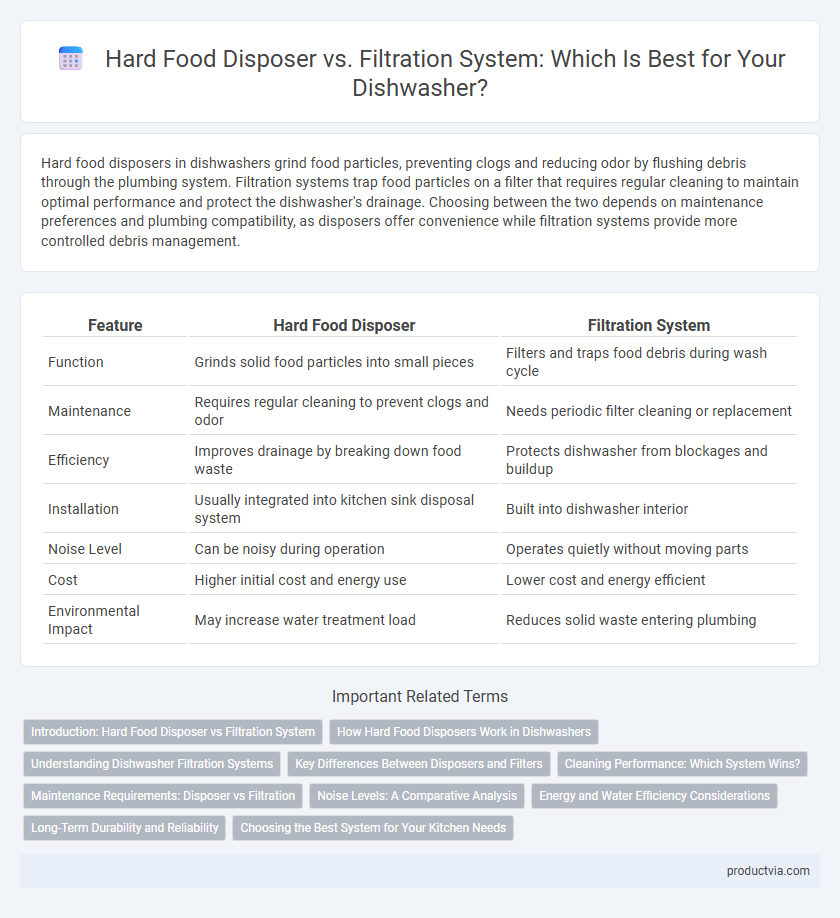Hard food disposers in dishwashers grind food particles, preventing clogs and reducing odor by flushing debris through the plumbing system. Filtration systems trap food particles on a filter that requires regular cleaning to maintain optimal performance and protect the dishwasher's drainage. Choosing between the two depends on maintenance preferences and plumbing compatibility, as disposers offer convenience while filtration systems provide more controlled debris management.
Table of Comparison
| Feature | Hard Food Disposer | Filtration System |
|---|---|---|
| Function | Grinds solid food particles into small pieces | Filters and traps food debris during wash cycle |
| Maintenance | Requires regular cleaning to prevent clogs and odor | Needs periodic filter cleaning or replacement |
| Efficiency | Improves drainage by breaking down food waste | Protects dishwasher from blockages and buildup |
| Installation | Usually integrated into kitchen sink disposal system | Built into dishwasher interior |
| Noise Level | Can be noisy during operation | Operates quietly without moving parts |
| Cost | Higher initial cost and energy use | Lower cost and energy efficient |
| Environmental Impact | May increase water treatment load | Reduces solid waste entering plumbing |
Introduction: Hard Food Disposer vs Filtration System
Hard food disposers in dishwashers break down food particles into smaller pieces, preventing clogs and maintaining optimal water flow during the wash cycle. Filtration systems capture and trap food debris within a mesh or screen, requiring regular cleaning to avoid buildup and ensure performance. Choosing between these systems impacts maintenance frequency, water efficiency, and overall dishwasher longevity.
How Hard Food Disposers Work in Dishwashers
Hard food disposers in dishwashers operate by grinding solid food particles into tiny fragments, preventing clogs and ensuring efficient drainage. These systems use a powerful motor connected to a rotating blade assembly that pulverizes leftover food during the wash cycle. Unlike filtration systems that trap debris, hard food disposers actively eliminate solid residues, reducing maintenance needs and improving dishwasher performance.
Understanding Dishwasher Filtration Systems
Dishwasher filtration systems play a critical role in maintaining efficient cleaning by trapping food particles and preventing them from redepositing on dishes. Unlike hard food disposers that grind large food debris into smaller pieces, filtration systems use fine mesh screens or filters to capture and hold food residues, requiring regular cleaning to avoid clogging. Understanding the type and maintenance of a dishwasher's filtration system is essential for optimal performance and longevity of the appliance.
Key Differences Between Disposers and Filters
Hard food disposers in dishwashers use sharp blades to grind food particles into small pieces, preventing clogs in plumbing systems, whereas filtration systems trap food debris in fine mesh filters that require regular cleaning to maintain efficiency. Disposers reduce the need for manual removal of food waste, improving convenience, while filtration systems emphasize water recirculation and cleanliness by filtering out solids before the water is reused. The main difference lies in disposers breaking down waste internally, whereas filtration systems rely on capturing and manually disposing of solid residues.
Cleaning Performance: Which System Wins?
Hard food disposers excel in breaking down large food particles, preventing clogs and ensuring consistent cleaning performance in dishwashers. Filtration systems trap food debris to avoid redepositing on dishes, but they require frequent filter cleaning and may struggle with fine particles. Overall, hard food disposers provide superior cleaning performance by efficiently managing diverse food residues during the washing cycle.
Maintenance Requirements: Disposer vs Filtration
A dishwasher equipped with a hard food disposer requires regular clearing of accumulated food particles to prevent clogs and maintain performance, often needing manual scraping or running disposal cycles. In contrast, a filtration system demands frequent cleaning or replacing of filters to avoid buildup and ensure efficient water drainage. Routine maintenance for disposers typically involves less frequent but more intensive cleaning, while filtration systems require consistent, scheduled attention to filter upkeep.
Noise Levels: A Comparative Analysis
Hard food disposers in dishwashers typically generate higher noise levels, averaging around 60-70 decibels due to the mechanical grinding of food particles. Filtration systems, which trap debris and require manual cleaning, produce significantly less noise, often operating below 50 decibels. Evaluating dishwasher noise levels helps consumers choose between the quieter filtration system and more robust disposal capabilities of hard food disposers.
Energy and Water Efficiency Considerations
Hard food disposers in dishwashers use energy to grind food particles, potentially increasing overall power consumption compared to filtration systems that require less energy by trapping debris without mechanical processing. Filtration systems contribute to water efficiency by enabling the reuse of rinse water, reducing the volume needed per cycle, while hard food disposers may necessitate additional water usage for flushing ground particles. Choosing filtration systems over disposers can optimize both energy and water efficiency, aligning with sustainable dishwasher operation goals.
Long-Term Durability and Reliability
Hard food disposers in dishwashers offer enhanced long-term durability by effectively grinding food particles, reducing clogging and maintenance needs compared to filtration systems that rely on mesh or screens prone to wear and tear. Filtration systems demand frequent cleaning and filter replacements to maintain performance, potentially compromising reliability over time. Investing in a dishwasher with a hard food disposer can result in consistent efficiency and extended appliance lifespan, minimizing downtime and repair costs.
Choosing the Best System for Your Kitchen Needs
Hard food disposers in dishwashers efficiently grind food particles, preventing clogging and enhancing drainage, ideal for kitchens with heavy food residue. Filtration systems trap and filter debris within the dishwasher, reducing maintenance and promoting cleaner wash cycles, suitable for delicate dishware and low food waste environments. Selecting between these systems depends on your kitchen's waste type, cleaning preferences, and maintenance willingness to optimize dishwasher performance.
Hard Food Disposer vs Filtration System for Dishwashers Infographic

 productvia.com
productvia.com